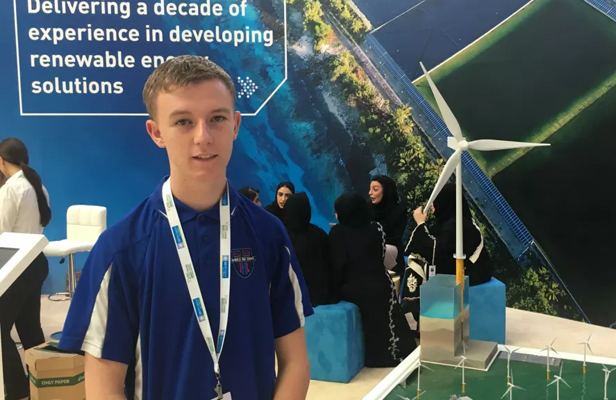With the final nail in the climate policy coffin driven home, younger Australians take up the battle

Toby Thorpe in Abu Dhabi in January last year, where his school, Huonville High, won the Oceania award for the Zayed Future Energy Prize for Global High Schools. PHOTO Peter Hannam, Sydney Morning Herald
Former CSIRO climate scientist John Church is now free of the constraints of government service and able to speak his mind. He did not mince his words in a Hobart Town Hall public meeting last week.
“It is clear that unabated emissions will wreak havoc on the lives of many hundreds of millions of people… and subsequent generations. There will be devastating, and in many cases irreversible, consequences for food and water security, human health and the natural environment,” he said.
Church warned that if carbon emissions remain high the loss of polar ice will see sea levels rise by at least a metre within a lifetime. In our part of the world we can expect to see many millions of displaced people causing emergencies that will dwarf today’s refugee crises.
Multiple attempts over the years to break climate policy deadlocks have all fallen at the hurdle of party politics. The Coalition’s rejection of Malcolm Turnbull’s National Energy Guarantee signals a dead-end in this long, exhausting political struggle.
Despite what has been implied in the political debate, Australians are firmly behind strong action to curb emissions. I earlier reported a 2018 Lowy poll finding that 59 per cent of all Australians and 70 per cent of adults under 45 want government to act now even at significant cost.
Last week the Australia Institute’s annual “Climate of the Nation” poll put the proportion of concerned Australians at 73 per cent, a rise of 7 per cent in just one year. The gap between Australians’ perceptions about climate change and the response of government is widening.
Church’s assessment was a sobering start for the Town Hall meeting. It might have been a miserable event, but there’s something about people coming together that defies negative attitudes. And while there are reasons for despair, there are just as many reasons to take heart.
Evan Franklin of the University of Tasmania’s Centre for Renewable Energy and Power Systems spoke of innovations in technology and business that are helping fill the energy policy void while also making electricity more affordable.
Hobart alderman Bill Harvey listed a dozen or more ways in which local governments are stepping into the breach left by national policy gridlock, listing his own administration’s solid successes over two decades in cutting energy use and carbon emissions.
Australian Conservation Foundation community organiser Bethany Koch was even upbeat about the NEG’s failure, which she said clarified the policy debate. She is leading a push in marginal seats aimed at making the next federal poll our first “climate election”.
Strong presentations by school and university students indicated a radical transformation in future policymaking led by a generation well and truly awake to the dangers described by Church.
One of the presenters, Huonville High student Toby Thorpe, was also a leading light at another event last week, the Climate Leaders Conference at the Mt Nelson Sustainability Learning Centre.
Secondary and primary students from southern Tasmanian schools spent the day planning projects under the umbrella of two key UN Sustainable Development Goals, climate action and the health of marine and aquatic habitats.
I had the pleasure of hearing and seeing the students, showing a level of understanding and maturity beyond their years, discuss initiatives they had led in their schools ranging from plant carbon science to waste management.
The projects being rolled out and the leaders’ program more broadly will be discussed by Toby Thorpe in the Asia-Pacific 2018 Virtual Youth Summit next week, an online meeting in which youth representatives share their projects and hopes for the future.
In November he will be taking thoughts and ideas from Tasmanian schools to an international audience at the 14th global Conference of Youth in the lead-up to the annual UN Climate Change Conference in Katowice, southern Poland.
This is generational change at work. Younger students learning about the global system, energy, resilience and sustainability are carrying a rising awareness of climate change from primary to secondary and beyond. All of it filters steadily into the wider community.
Generational change spells danger for politicians and political parties failing to grasp the level of concern felt by young Australians over climate change, and the frustration and anger they feel over the clear failure of government to address it.
The state of the economy usually determines elections, and it takes a big issue and some focused campaigning to supplant that. But young people are key to what Bethany Koch is aiming for in the next federal poll: our first true climate change election.
That poll will almost certainly be in autumn 2019. If our summer is anything like the record-breaking scorcher experienced this year in large parts of North America, Europe, Asia and North Africa, it’s a fair bet that climate will be a significant, if not defining, issue.
